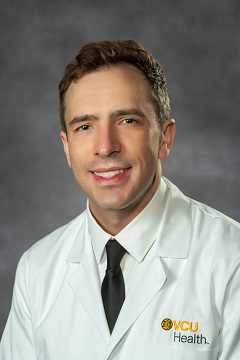 Austin Wiles, MD
Austin Wiles, MD
Assistant Professor
Director of Autopsy
Medical Director of Decedent Affairs
What role have you played in COVID-19 preparations as it relates to the autopsy service and morgue? What are some of the successes and challenges you have faced?
The autopsy service was essentially closed by Governor Northam’s Executive Action #2 which prohibited the use of PPE by hospitals for non-life saving medical procedures. For families that had requested an autopsy, but could not receive one, our decedent affairs administrator and I spoke with the individual families. In many cases, I did an in-depth review, over the phone, of the decedents medical records to address each family’s specific concerns. Essentially, I performed a paper autopsy for these families.
The hospital mandated that the morgue capacity be expanded “at least 50% above top normal capacity.” With built-in coolers and racks with water-cooled blankets our maximum normal capacity was 38 decedents. So we obtained a refrigerated truck and had additional racks fabricated. We had the plant ops fabricate a ramp, campus police provide security, and obtained temperature monitoring equipment. Decedent affairs generated a workflow to allow for knowing where each decedent was located.
How has the pandemic impacted services?
While autopsy is closed for now, the Governor has stated his intention to relax restrictions concerning non-life saving medical procedures. Since re-opening the autopsy service must first and foremost keep the autopsy staff safe, we have worked with microbiology to establish post-mortem, pre-autopsy COVID-19 testing pathway for any decedent with an autopsy request lacking a confirmed negative COVID test. Nasopharyngeal swabs with viral PCR is a robust method for detecting viruses in decedents. I used it frequently as a forensic pathologist.
What is a day on the job like since the pandemic began?
Since many cancer related procedures are life-saving, much of my cytology and head and neck practice has continued. A greater proportion of cases are positive for cancer. I have had some exotic tumors show up. Generating consensus is difficult due to social distancing. Sign-out happens via teleconference, which makes teaching difficult. The first layer of feedback is eye contact with a trainee.
My Autopsy/Decedent Affairs administrative roles have been very busy. The Code of the Commonwealth of Virginia is very specific about the care of decedents. Autopsy is a small service and myths often overshadow facts with most people. I have spent large amounts of time answering questions from diverse sources, from the nurses who screen every patient coming into the hospital, to hospital senior leadership.
What do you think will be the lasting impact of COVID-19 on your work, the health system, and healthcare as a whole?
Performing autopsy during a pandemic with a new pathogen is not the same as performing autopsy when the virulence of a pathogen is well known. The worst error we could make is impose, in advance, the structure of relations necessary for survival. The safe performance of autopsy is dependent on having a calcium alginate swab. For me to safely use the elevator requires the entire supply chain of masks and sanitizers to the custodial personnel in cleaning the buttons.
Anything else you would like to add?
"The world is not a solid continent of facts sprinkled by a few lakes of uncertainties, but a vast ocean of uncertainties speckled by a few islands of calibrated and stabilized forms." – Bruno Latour in Re-assembling the Social: an Introduction to Actor-Network Theory